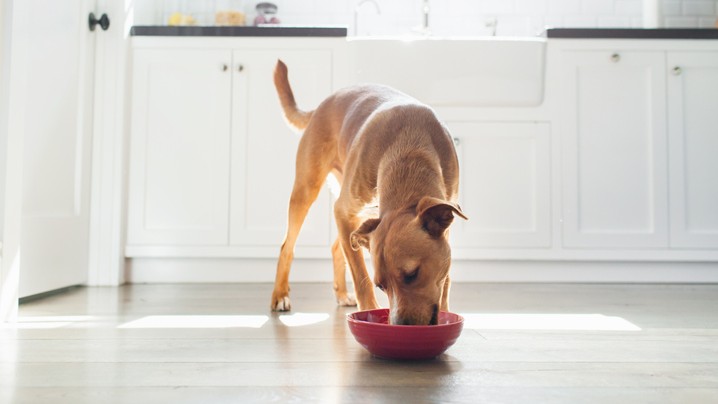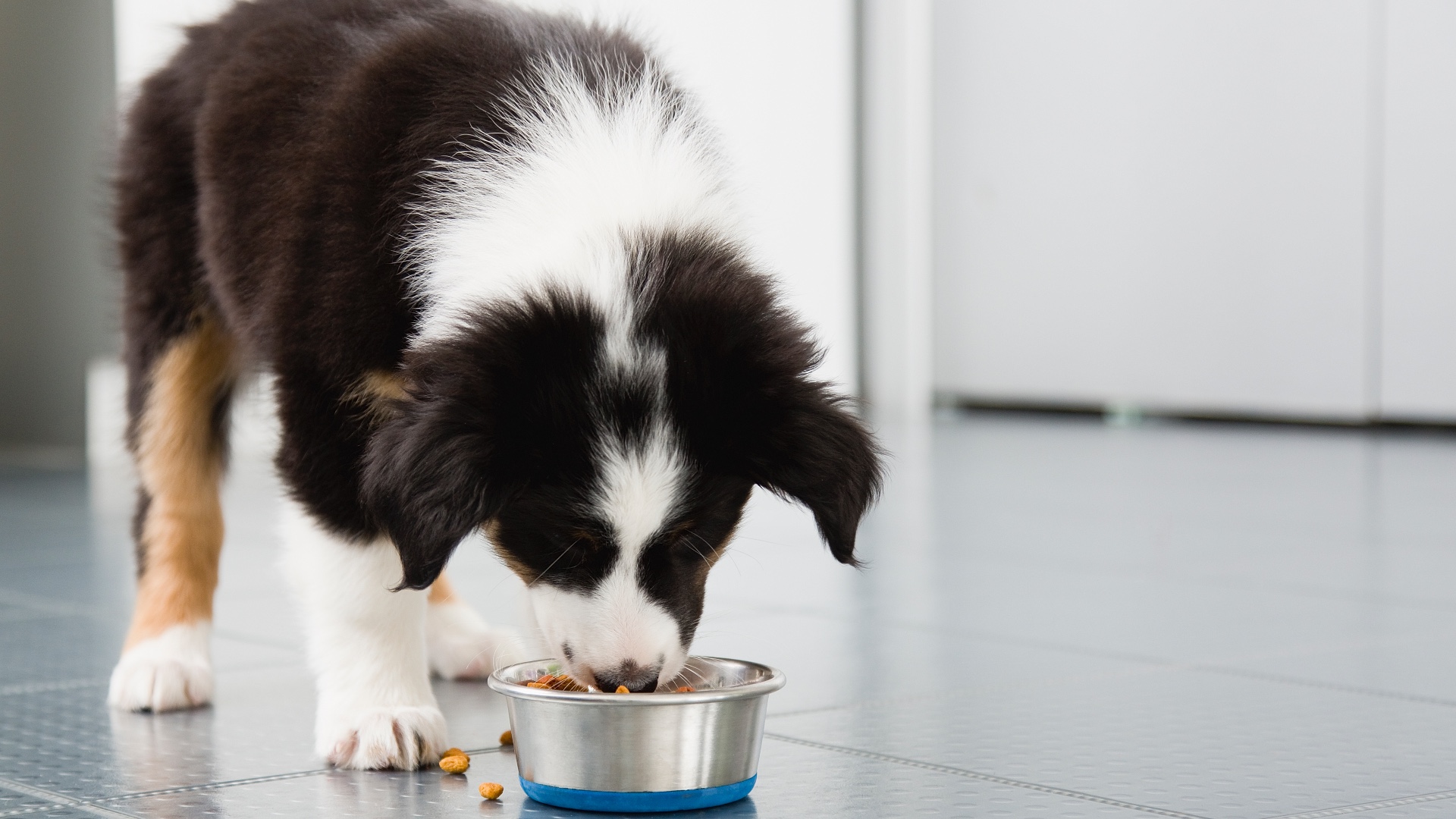Is grain-free dog food good for their health?
Grain-free dog foods are trending amongst pet owners—but are they a good option for your pooch?

Get the best advice, tips and top tech for your beloved Pets
You are now subscribed
Your newsletter sign-up was successful
When it comes to canine nutrition, it seems like everyone is talking about grain-free foods. Some people believe that grain-free is the solution to food allergies in dogs, while others state that it can cause loose stools or diarrhea. The ongoing debate about grains or no grains is enough to send even the most diligent pet parent's head spinning!
You may be wondering if the best dog food for allergies is really worth investing in or whether this is just another fad designed to rob you off your precious pennies! Below, you’ll find everything you need to know about grain-free dog food, including a look at both the benefits and the risks so that you can make the right decision for your canine companion.
- Skin allergies in dogs: Vet's guide to signs and treatment
- Nine tips for coping with allergic pets
- Four common allergies in dogs and what you can do about them
What is grain-free dog food and how is it different from regular dog food?
Unlike a lot of the best dog food lining the shelves, as its name implies, grain-free dog food does not contain any grains, such as wheat, corn, barley, oats, rye, rice, and soy. Regular dog foods often include grains as ingredients to provide carbohydrates as a source of energy and fiber to support digestion.
That isn’t to say, however, that grain-free dog foods are low in carbs. Although some companies advertise that their grain-free foods are similar to what dogs’ ancestors ate in the wild (i.e., more meat), many grain-free diets substitute grains for other carbohydrates like legumes and potatoes. In fact, grain-free diets can sometimes be higher in carbs than normal dog foods, which can lead to weight gain if food intake is not closely monitored.
Another common myth is that grain-free diets use higher-quality ingredients than regular dog foods, which is simply untrue. The quality of ingredients will depend on the brand of dog food, and your veterinarian will be able to recommend brands that they trust.
Do dogs need grain?
Although grains can be considered nonessential, they are an excellent source of nutrients in dogs. They can provide nutrients like vitamin B, iron, magnesium, selenium, and essential fatty acids, as well as carbohydrates and fiber.
Dogs have evolved over thousands of years to have the ability to better digest grains while adapting to domestication. In fact, studies have suggested that dogs are five times better than wolves at digesting starches such as wheat and rice.
Get the best advice, tips and top tech for your beloved Pets
Differences between grain-free and gluten-free dog food
Another recent trend in the pet food industry is gluten-free dog food. Gluten-free foods do not contain grains such as wheat, barley, and rye. Unlike grain-free diets, however, they often include other grains that don’t contain gluten, like corn and rice.
Although humans with celiac disease benefit greatly from gluten-free diets, there is no evidence that the same disease process occurs in dogs. According to Purina, less than 1% of dogs have gluten-sensitive enteropathy, a similar sensitivity described in a small number of Irish Setters in the United Kingdom.
What are the benefits of grain-free dog food?

Grain-free dog food can be beneficial in dogs who have a true grain allergy. Food allergies can present with skin problems, gastrointestinal symptoms, or both. It is important to note, however, that the vast majority of food allergies and intolerances are related to animal protein sources. According to the Clinical Nutrition Team at Cummings Veterinary Medical Center, Tufts University, the most common food allergies reported in dogs are chicken, beef, dairy, and eggs.
If you suspect that your dog has a food allergy or intolerance, you should consult with your vet to rule out any underlying health conditions and identify potential triggers (food-related or otherwise) for your pup’s symptoms.
What are the risks of feeding grain-free dog food?
As grain-free diets grew in popularity, the US Food and Drug Administration (FDA) identified a possible link between grain-free foods and dilated cardiomyopathy (DCM) in dogs. DCM is a cardiac disease in which the heart becomes enlarged, thus interfering with the heart’s ability to pump blood to the body and often leading to congestive heart failure. Although a few breeds have a genetic predisposition to developing DCM, like the Doberman Pinscher, the FDA received more than 1,100 reports of DCM in dogs in a wide variety of breeds between January 1, 2014 and July 31, 2020. Of the cases that reported the dog’s diet, 91% consumed grain-free dog foods.
It is suspected that grain-free diets or diets high in legumes (a common substitute for grains in grain-free foods) may be deficient in taurine, an amino acid important for heart health, or have an effect on its bioavailability. Luckily, a study in Golden Retrievers fed grain-free or legume-rich diets who were diagnosed with DCM and taurine deficiency found that most of the dogs’ conditions improved with diet change and taurine supplementation.
Since the FDA is still investigating this issue, the association between grain-free diets and DCM has not been confirmed. Dog owners should still be aware of the current evidence, and owners feeding grain-free foods to their pup should keep an eye out for signs of heart disease, including lethargy, difficulty breathing, weight loss, coughing, enlarged belly, and collapse.
Is grain-free food right for your dog?
With the potential risks of feeding a grain-free diet and the lack of scientific evidence demonstrating that it is superior to grain-containing foods, grain-free foods likely benefit only those dogs with true grain allergies or intolerances. As a study published in Veterinary Clinics of North America: Small Animal Practice states, “Concerns about grains in pet food was based on marketing rather than science”.
If you feel that your dog would benefit from grain-free food or if you suspect that they are allergic to grains, you should consult with your local veterinarian to discuss whether a grain-free diet would be a good choice for your beloved pooch.
Dr. Diana Hasler graduated with distinction from the University of Edinburgh Royal (Dick) School of Veterinary Studies in 2018. She has experience working as a small animal veterinarian in general practice, where she has treated many dogs, cats, rabbits, and rodents. She has also recently branched out into the field of medical communications, doing freelance work as a medical editor and writer. Dr. Hasler has been Postdoctoral Research Fellow at Michigan Medicine since 2023, where she is a Laboratory Animal Medicine Resident.

